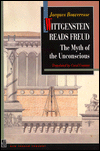Freud's Subconscious as a "Means of Representation"
 In his Lectures, Cambridge 1932-1935, Wittgenstein says that "What Freud says about the subconscious sounds like science, but in fact it is just a means of representation."1 Bouveresse addresses this assertion: "What interests me is his way of suggesting that the hypothesis of the unconscious is merely a manner of speaking, which could in principle be discarded without any challenges to what Freud is really saying."2
In his Lectures, Cambridge 1932-1935, Wittgenstein says that "What Freud says about the subconscious sounds like science, but in fact it is just a means of representation."1 Bouveresse addresses this assertion: "What interests me is his way of suggesting that the hypothesis of the unconscious is merely a manner of speaking, which could in principle be discarded without any challenges to what Freud is really saying."2
But, taking in the whole of his remarks on Freud, it becomes evident that Wittgenstein sees psychoanalysis itself, not just the unconscious, as "a means of representation."
Bouveresse, as well as Descombes in the forward to Wittgenstein Reads Freud, both attest that Wittgenstein saw psychoanalysis as a way of speaking. Monk, too, comes to the conclusion that Wittgenstein viewed the entire project of psychoanalysis, not just the unconscious, as a way of speaking.
 "Freud's explanations," Monk writes, "have more in common with a mythology than with science. ... Freud's explanations, then, are akin to the elucidations offered by Wittgenstein's own work."3 Monk goes on to quote Wittgenstein's remark that people, in accepting the explanations of psychoanalysis, "have given up one way of thinking and adopted another."
"Freud's explanations," Monk writes, "have more in common with a mythology than with science. ... Freud's explanations, then, are akin to the elucidations offered by Wittgenstein's own work."3 Monk goes on to quote Wittgenstein's remark that people, in accepting the explanations of psychoanalysis, "have given up one way of thinking and adopted another."
Wittgenstein himself readily applied the view to other aspects of psychoanalysis besides the unconscious. He said, for instance, even a dream could be looked at "as a kind of language. A way of saying something."4
Notes
1. Quoted by Bouveresse in his book, Wittgenstein Reads Freud. p. 27.
2. Ibid. 27.
3. Raymond Monk, Ludwig Wittgenstein: The Duty of Genius. p. 438.
4. Wittgenstein Reads Freud. p. 48.
Related Pages
Wittgenstein Contra Freud: The Myth of Psychoanalysis
Points of Contact and Criticism Between Wittgenstein and Freud
A Wittgensteinian Approach to Discourse Analysis
Indoctrination and Resistance in Psychotherapeutic Dialogue
Construction of The Double As Social Object